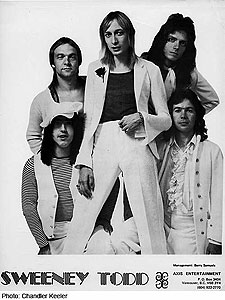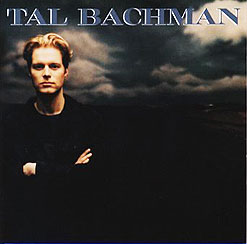Oh! Canada (You Pretty Things)
Published on May 30th, 2012 in: Canadian Content, Issues, True Patriot Love |By Christian Lipski
Nick Gilder and Tal Bachman: Great White Northerners and purveyors of melodic sound since 1975; both are identified by one song, but have equally engaging back catalogs. More popular in Canada than further south, they both suffered from a severe lack of regard by listeners everywhere. Much more than their singles, and at the same time those singles’ very equal.

In his earliest incarnation, Gilder (born, incidentally, in England) was the frontman for the group Sweeney Todd. A more glam name would be hard to come by, with theatrical roots and resonating with “sweetie.” Their sound was oh so fey and saucier than a French menu.
Their biggest hit, “Roxy Roller,” was recently revived for the soundtrack of the Runaways biopic. It’s a swinging shuffle about a naughty girl who was going down on you in a theater before fellow Canadian Ms. Morrisette was. That track will sum up the album for you—if you dig that, you’ll love the rest of the songs, from “Juicy Loose” to “Rue de Chance.”
There may be too much sugar in Sweeney Todd’s grooves for some, but that’s fine because after the first album, Gilder split to go solo. (Bonus trivia: the second Sweeney Todd album was sung by a young Bryan Adams, who still had to have his vocals pitched higher to match Gilder’s.)
Once on his own, Gilder began to mellow out the extreme glam of Sweeney Todd and develop his own sound. Still poppy and still sassy, Gilder took a more confrontational stance with his music, transitioning from glitter into a power pop outfit.
His first solo effort, 1977’s You Know Who You Are, is certainly a transitional record, as the US release includes a re-recording of “Roxy Roller” for the Americans who may not have picked up Sweeney Todd. “Rated ‘X’,” which Pat Benatar included on her own debut two years later, could be heard as Roxy’s continuing adventures.

Nick Gilder
It was next year’s followup, City Nights, that caught the public’s ear and gave Gilder his second Canadian and first (and only) US #1 hit. “Hot Child In The City” was on every radio station’s heavy rotation list, with a funky chorus and catchy hook. Another song about a desirable female, “Hot Child” showed that Gilder had definitely found his niche.
The second single, “Here Comes The Night,” is less recognizable but more fun, hearkening back to more glittery times in the vocal. It only hit #21 in Canada and #44 in the US, but deserves much more attention. Just as with You Know Who You Are, if you like City Night‘s singles, you will not be disappointed by any other track.
Despite his success with “Hot Child” (City Nights did not chart in the US), Gilder wasn’t able to recapture that lightning. His sound remained essentially the same, though it did evolve with the technology of the times. “(You Really) Rock Me” from 1979’s Frequency got to #57 in the US (#35 in Canada), but his days were numbered among the radio listeners.
Subsequent albums continued Gilder’s plaintive vocal style, always framed by energetic backing tracks. His 1980 album Rock America saw two singles reach the Canadian charts, but his name wasn’t seen there again until five years later, when a couple more songs climbed to the bottom half of the Canadian top 100. As a songwriter, he had more success post-“Hot Child,” as his co-written song “The Warrior” was a #1 Canadian hit for Scandal (#7 in the US).
Gilder continued to release albums through the end of the ’90s, and tours frequently. He has even appeared with his former band Sweeney Todd at festival dates throughout Canada.
In 1999, as Nick Gilder released his last album, Longtime Coming, another Canadian with power pop sensibilities was releasing his first.
The son of the B in BTO, Tal Bachman’s self-titled debut would contain his only US hit, “She’s So High.” Due to the compartmentalization of radio demographics, the song would reach #14 on the Hot 100 chart, but #1 in “Adult Top 40.” Likewise in Canada, the song was #3 in the main chart, but #1 on three others.

Bachman’s first album is filled with pure pop sounds, opening up with the anthem “Darker Side of Blue” and moving right on to “She’s So High.” Tal Bachman contains more ballads than any of Gilder’s catalog, and tends to a slower tempo overall, but the melodies—and even to some extent the vocal delivery—echo that of the elder singer. Bachman’s voice wraps itself around the notes, moving from one to the next with a leisurely drawl.
It’s more difficult to state that the single is matched by the rest of the disc, since there are softer moments that don’t appear on “She’s So High,” but it’s fair to say that most of the album is of the same stripe as the single. Bachman is adept at the quiet verse that builds to magnificence. His command of the sweet spot between melody and chord is nearly ridiculous, to be perfectly honest.
As with Gilder, there are many possible explanations for Bachman’s inability to return to the same heights. All are conjecture and more than likely filled with dislike for the music industry’s marketing tactics, and will not be enumerated.
Unlike Gilder, Bachman was not encouraged to continue making records by his label, and disappeared for years, two of them spent as a missionary for the Mormon church. In 2004 his second album Staring Down The Sun was released in Canada, and the single “Aeroplane” reached #20 there. It was not until 2006 that an American company picked up the disc for the States, where it received no promotion and sank like a stone.
Bachman’s second disc is more reflective than his debut, likely influenced by his experience in the music business and his recent split with his church. The reduced production budget for the album may also contribute to the more intimate sound, which lacks the big-time slickness of the first record.

Taylor Swift and Tal Bachman, 2011
Nevertheless, Staring Down The Sun contains moments that recall the proud pop of years before, in “Aeroplane” and “Masquerade,” while tracks like “Danger by Design” show a more earthy side to the songwriter. It’s more difficult to find, but fans of the first album will find it to be worth the search.
It takes real effort to come back from so many years to make a second album, so Bachman obviously still felt that he had more to say. Just as obviously, he seems to have said what he needed to say, noting the time since the release of Staring Down The Sun.
It’s exciting, as an American, to think of how many worthwhile bands may be in hiding up North, kept out of our sight by the fickle whims of radio and MTV. It’s like searching for treasure, with Nick Gilder and Tal Bachman only two of the more visible jewels.
Time limit is exhausted. Please reload the CAPTCHA.